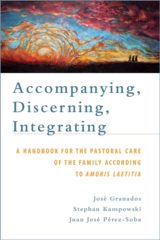By Dr. Stephen Kampowski, Rev. Jose Granados, Rev. Juan Jose Perez-Soba
Dr. Stephen Kampowski, Rev. Jose Granados, and Rev. Jaun Jose Perez-Soba collaborated at the Pontifical John Paul II Institute for Studies on Marriage and Family in Rome. They co-authored Accompanying, Discerning, Integrating: A Handbook for the Pastoral Care of the Family According to Amoris Laetitia.

It is often thought that priests are the only ones who accompany persons. In fact, this is not the case: the first place in which we are accompanied is the family. It is normally our mother’s hand that first accompanies us to Mass and helps us, in a loving, maternal way, to know the Church and the faith that enlightens us.
Pope Francis is perfectly aware of this: “Families cannot help but be places of support, guidance and direction, however much they may have to rethink their methods and discover new resources. Parents need to consider what they want their children to be exposed to” (Amoris laetitia 260). In the first place, this is about giving love and allowing it to grow in the unique, common life of the family In the family, faith finds a natural place in which to be transmitted and strengthened and is immersed in an atmosphere of freedom that is typical of true love: “Parents desirous of nurturing the faith of their children are sensitive to their patterns of growth, for they know that spiritual experience is not imposed but freely proposed” (AL 288). This is why the Apostolic Exhortation also shows us the negative process that is observed when there is a lack of natural accompaniment as love grows, particularly when between spouses: “Otherwise, our family life will no longer be a place of understanding, support and encouragement, but rather one of constant tension and mutual criticism” (AL 108).
From this consideration arises the profound conviction that in the pastoral care of the family, it is the family itself that is the subject and active agent of evangelization (AL 200). What this means, concretely, is that we must avail ourselves of families in order to accompany families. This is the missionary vocation of the Christian families (cf. AL 208, 230, 289), which are called by God to accompany those around them in faith and life, offering neighborly assistance and the support of the richness of a family life that is full of God. Without this preliminary step, all the rest is nothing but a series of rhetorical expressions devoid of the necessary support of the concrete ecclesial community.
Many families have already recognized this mission that God entrusts to them, but our diocesan churches do not yet have available a network of families that is sufficiently large to address this task. Moreover, it must be taken into consideration that good will is not enough. Suitable formation is necessary in order to work more readily and responsibly. Now, Amoris laetitia addresses such families several times and takes their service to the Church as a given. It upholds, as exemplary, those couples who have matured and gained a certain amount of experience in starting a family, and who are thus ready to accompany others. For engaged couples, and those in the first years of family life, such support is essential.
You Might Also Like

The Apostolic Exhortation Amoris Laetitia has given rise to different interpretations. Any in-depth study of its theological conclusions will undoubtedly require time and patience. What cannot wait, however, is attending to the practical questions it has raised. After all, no one can abstain from acting: priests hearing confessions, bishops who need to give guidelines on pastoral activity to their priests, and families working in the field of pastoral care. Accompanying, Discerning, Integrating: A Handbook for the Pastoral Care of the Family According to Amoris Laetitia is intended to offer sure practical guidelines on this important matter of the Church’s pastoral activity.

